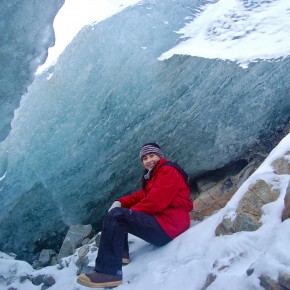
Ashley Nelson – Adjunct Research Assistant, University of Oregon
Having spent most of my life near the coast, it is little wonder that I became so intrigued with aquatic life. I doggedly pursued my passion for marine biology from the seventh grade onward, eventually enrolling at the University of Oregon after learning of their undergraduate program at the Oregon Institute of Marine Biology. My undergraduate years were spent exploring the various fields of the marine sciences, quickly discovering my particular interest for marine ecology and ichthyology. Towards the end of my third year, I went on to conduct my own experiment for an undergraduate thesis through the Robert D. Clark Honors College. The project involved investigating the homing behavior and site fidelity of the black prickleback, an intertidal fish found along the west coast, through tag and release methods.
It was through my primary thesis advisor, Alan Shanks, that I was informed of an extraordinary research opportunity in my fourth year. John Postlethwait, from the UO’s Institute of Neuroscience, was searching for an undergraduate or recent graduate interested in doing research on icefish in Antarctica. I jumped at the opportunity, though not without some feelings of uncertainty and trepidation towards the journey and the nearly 6-month duration through the Antarctic winter. Excitement and curiosity trumped all other feelings in the end and shortly after the decision was made, I was on my way to Palmer Station, Antarctica.
As part of the Postlethwait team, I was tasked with investigating the embryonic development of notothenioids, or icefish. These fish have evolved to survive in the cold Antarctic waters through specific adaptations, including reduced ossification of their musculoskeletal system. Some of the duties of my position included going on fishing trips on a large Antarctic vessel, maintaining the health of our stock, and collecting various tissues from adult fish. I helped collect and raise the embryos of these fish, sampling them at various developmental stages in relation to bone/cartilage development and the genetic factors associated with reduced ossification. Of course, I also got to thoroughly enjoy the awe-inspiring scenery and wildlife that Antarctica had to offer!
Since my return from Palmer Station, I’ve continued my position as a research assistant in the Postlethwait lab. I currently assist in the Fanconi anemia research, using zebrafish as a model organism for genetic regulation. Fanconi anemia (FA) is a rare genetic blood disorder that leads to bone marrow failure and cancer in those that inherit the defective gene from both parents. I run small molecule screens for compounds that can rescue this mutation in zebrafish expressing Fanconi anemia. I’ve learned a lot since I started, including the value of genetic research and model organisms in understanding human diseases.
I plan to remain as a research assistant in the Postlethwait lab for the next year before pursuing further careers or enrolling in graduate school for a master’s degree in marine or zoological sciences. Ultimately, I would love to work in fisheries management as a biological technician or fish biologist, as I have always had a strong interest in population studies and conservation of aquatic resources. I believe my time with the University of Oregon, particularly the Postlethwait lab, has provided me with the knowledge and skills to pursue my career goals. No words can describe the gratitude I owe the university faculty and researchers in providing these incredible opportunities that have helped shaped my life.
